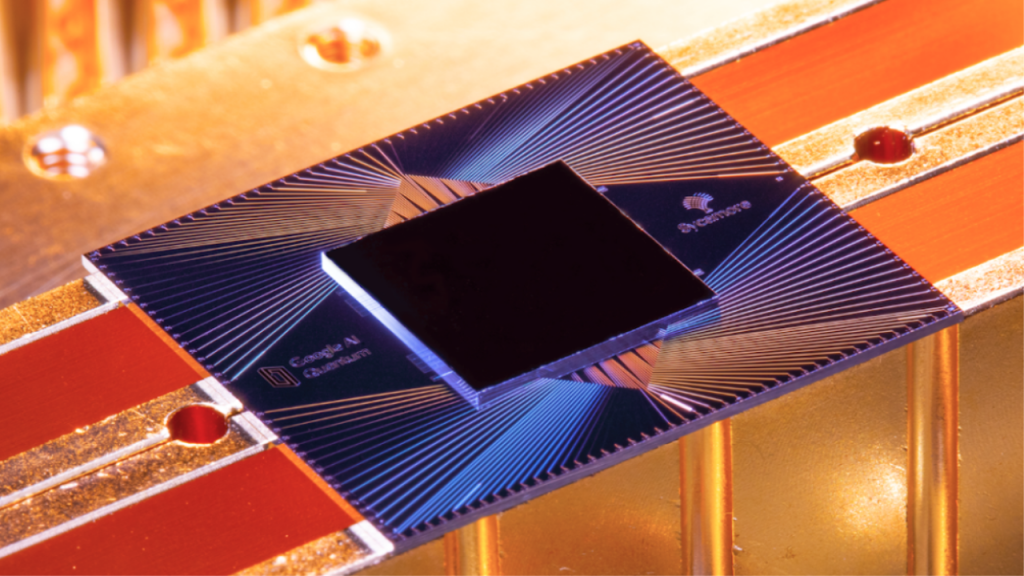
24th October 2019
Google Claims superfast Quantum Computing Achievement, IBM Says Not So Fast
By PC Mag
[apss_share]

Google claims to have made a breakthrough in quantum computing with an experiment that shows the technology performing a computation traditional CPUs can never realistically achieve.
The research, which was originally published and then un-published last month, has been grabbing headlines over how Google allegedly accomplished "quantum supremacy," or when a quantum computer can solve a problem our current computers cannot.
So what problem was exactly solved? Well, nothing really. Google's experiment basically involved running a benchmark test on a quantum computer, and comparing the performance to a classic supercomputer. The result: The company's experimental system, dubbed Sycamore, was able to perform a computation that would have taken the world's fastest supercomputer 10,000 years to calculate in 200 seconds.
Although the experiment involved a benchmark test, the feat demonstrates the technology works, and can achieve enormous speed gains over classical computers, said Google CEO Sundar Pichai. He's going as far to describe the research as like humanity launching the first rockets into outer space.
Google Claims Quantum Computing Achievement, IBM Says Not So Fast

Google claims to have made a breakthrough in quantum computing with an experiment that shows the technology performing a computation traditional CPUs can never realistically achieve.
The research, which was originally published and then un-published last month, has been grabbing headlines over how Google allegedly accomplished "quantum supremacy," or when a quantum computer can solve a problem our current computers cannot.
So what problem was exactly solved? Well, nothing really. Google's experiment basically involved running a benchmark test on a quantum computer, and comparing the performance to a classic supercomputer. The result: The company's experimental system, dubbed Sycamore, was able to perform a computation that would have taken the world's fastest supercomputer 10,000 years to calculate in 200 seconds.
Although the experiment involved a benchmark test, the feat demonstrates the technology works, and can achieve enormous speed gains over classical computers, said Google CEO Sundar Pichai. He's going as far to describe the research as like humanity launching the first rockets into outer space.
"At the time, some asked: Why go into space without getting anywhere useful? But it was a big first for science because it allowed humans to envision a totally different realm of travel," he wrote in a blog post today. "That's what this milestone represents for the world of quantum computing: a moment of possibility."
But not everyone is buying the hype. IBM has been raining on Google's parade by claiming that a traditional supercomputer can actually pull off Google's quantum supremacy experiment; all it needs is a more disk storage to simulate a quantum computing operation.
"We argue that an ideal simulation of the same task can be performed on a classical system in 2.5 days and with far greater fidelity," IBM said in a blog post earlier his week. "This is in fact a conservative, worst-case estimate," the company added.
What Is a Quantum Computer?
The dispute between Google and IBM—which has been working hard on its own quantum computer— deals with how the technology works. Classical computers on a foundational level run on binary code, or 1s and 0s. The electric signal flowing through your computer's transistors are constantly switching between these binary digits, which can be stitched together in strings to represent more complex computing instructions.
A quantum computer, on the other hand, taps into a strange, but fundamental phenomenon in quantum mechanics, where a subatomic particle can occupy several positions all at one time. Making the quantum world even stranger is how particles can become entangled. The position of one electron can affect the position of another, and vice-versa, even though they may be far apart.
Building a computer around these concepts can allow a machine to move beyond binary and calculate operations at exponentially higher rates. As a result, a quantum computer holds the promise of performing millions of computations at a single time when a classical computer is restricted to doing one computation at a single moment.
But a big challenge facing the next-generation technology is trying to apply quantum computers to real-world problems when existing computers can generally do the same jobs. For example, today's supercomputers are already being deployed to render complex simulations, such as nuclear testing, for scientific research.
It's why IBM is dismissing Google's claim that it achieved quantum supremacy. "A headline that includes some variation of 'Quantum Supremacy Achieved' is almost irresistible to print, but it will inevitably mislead the general public," the company's quantum computing researchers wrote in their blog post.
"First because, as we argue above, by its strictest definition the goal has not been met. But more fundamentally, because quantum computers will never reign 'supreme' over classical computers, but will rather work in concert with them, since each have their unique strengths," they added.
Why Google's approach still matters
That all said, Google's quantum computer is still an impressive achievement, according to quantum computing expert, Scott Aaronson, a professor at the University of Texas at Austin. He points to the time needed for Google's system to complete the benchmark versus a traditional supercomputer. "Three minutes versus 2.5 days is still a quantum speedup by a factor of 1200," he wrote in a blog post, discussing the research.
Aaronson compares the dispute to how Garry Kasparov famously competed against a computer, IBM's Deep Blue, in chess to eventually lose in a 1997 rematch. In this case, IBM is ironically playing the role of Kasparov while Google's quantum computer is Deep Blue. Sure, a traditional computer can put up a fight, but in the end the quantum computer will reign supreme.
"As Kasparov himself well knew, the very fact that the contest was close meant that, either way, human dominance was ending," Aaronson writes.
Despite IBM's criticism, Google says its confident the company's achievement can be applied to real-world computing in the near future. The idea is to essentially use the technology for scientific research by letting researchers test new designs or theories in hyper-realistic simulations only a quantum computer can run.
"Quantum computing gives us the best possible chance of understanding and simulating the natural world at the molecular level," Pichai said. "With this breakthrough we're now one step closer to applying quantum computing to—for example—design more efficient batteries, create fertilizer using less energy, and figure out what molecules might make effective medicines."
[apss_share]






